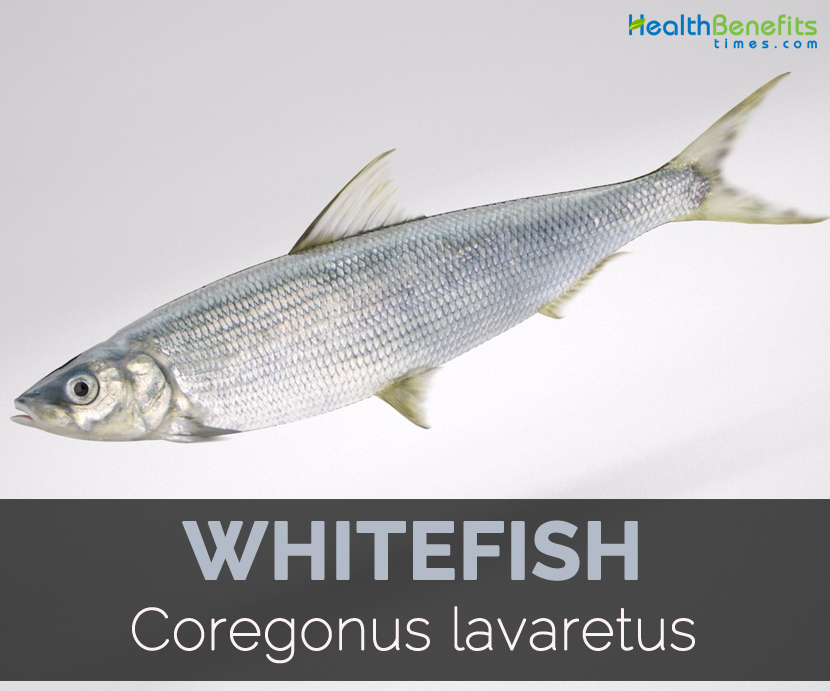| Whitefish facts and nutrition value Quick Facts |
| Name: |
Whitefish facts and nutrition value |
| Scientific Name: |
Coregonus lavaretus |
| Origin |
It is native to Swiss French border and is also found in Lake Aiguebelette and Lake Bourget as well as Lake Geneva. |
| Colors |
Bluish green, brownish |
| Shapes |
Tapered body, elongated, Length: 55 cm (22 inches) |
| Flesh colors |
Dry, white |
| Calories |
265 Kcal./cup |
| Major nutrients |
Isoleucine (103.89%)
Lysine (103.53%)
Tryptophan (95.91%)
Threonine (93.86%)
Valine (91.95%)
|
| Health benefits |
Stronger bones, Rejuvenate cells, Cure anemia, Enzyme functions, Digestive health |
European Whitefish or Common Whitefish (Coregonus lavaretus) is the freshwater species of whitefish that is native to Swiss French border. Other vernacular names used for this fish includes Bratfisch, Breitfisch, Kaiserfisch, Knöpfling, Maräne, Meermaraene, Ostseeschnäpel, Peipusmaraene, Rindling, Sandgangfisch, Sig, Chudski sig, Lavereto, Lavarello, Coregone and others. It belongs to the subfamily Coregoninae and family Salmonidae. It has short snout which is tapered. Their coloration is typically from bluish green to brownish with dark grey and white fins. European whitefish reach a weight of 2 kg (4.4 lb) measuring the body above 55 cm (22 inches) long. It feeds on crustaceans, large insect larvae, molluscs, small fish, fingernail clams, opossum shrimp, snails and midge larvae. The breeding usually takes place in between September to November.
History
It is found in deep and oligo mesotrophic lakes. It is extensively found in Central, Northwest Europe and Siberia. It is native to Swiss French border and is also found in Lake Aiguebelette and Lake Bourget as well as Lake Geneva.
Nutritional value
One fillet of 154 g covers 100.24 g of moisture, 265 calories, 37.68 g of protein, 11.57 g of total lipid fat and 2.22 g of ash. It also offers 1.737 g of DV of Isoleucine, 3.462 g of DV of Lysine, 0.422 g of DV of tryptophan, 1.652 g of DV of threonine, 1.942 g of DV of valine, 1.11 g of DV of histidine, 3.063 g of DV of leucine, 533 mg of DV of phosphorus, 37.68 g of DV of protein, 1.48 µg of DV of vitamin B12, 24.9 µg of DV of selenium, 0.533 mg of DV of vitamin B6, 5.923 mg of DV of vitamin B3, 11.57 g of DV of total lipid fat, 1.332 mg of DV of vitamin B5, 0.263 mg of DV of thiamine, 0.237 mg of DV of riboflavin, 1.96 mg of DV of zinc, 0.142 mg of DV of copper, 65 mg of DV of magnesium and 625 mg of DV of potassium.
Health Benefits of Whitefish
Whitefish is loaded with high content of protein, Vitamin B, selenium, iodine and has low concentration of fat. It is also an excellent source of omega-3 fatty acids. Due to various nutrients present in whitefish it provides ample health benefits if added to the diet. Seafood have numerous benefits if consumed in limited amounts.
- Stronger bones
Phosphorus plays a vital role in the growth and formation of strong bones to sustain the wear and tear. It promotes the enamel of tooth and gum health. It provides relief from the conditions such as osteoporosis. It is also shown that phosphorus is related to prevent from the cardiovascular problems as well. (1) (2)
- Rejuvenate cells
Healthy body is essential for the contribution of tissues and cells. The body needs the continuous formation of tissues and cells such as hair, skin and nails. The decreased cells should be replaced with the new ones. Protein assists in the reformation of tissues as well as cells. (3) (4)
- Cure anemia
Vitamin B12 is essential for the treatment of megaloblastic and pernicious anemia. It also restore the normality of blood and Intrinsic factor. (5)
- Enzyme functions
Vitamin B6 is essential for the various enzyme functions properly. The relation between enzymes and Vitamin B6 is vital for the proper functions of nervous system, immunity and relief from arthritis. (6)
- Digestive health
Vitamin B3 supports the functions of digestive health, proper function of nerves, promote appetite and skin health. (7)
- Reduce stress
Pantothenic acid effectively lowers stress as well as mental conditions such as depression and anxiety. It promotes the fitness of mind. It also regulates the hormones that are the cause for these problems. (8)
- Enhance memory
Thiamin promotes the memory as well as the concentration power. It helps to manage the conditions such as Bell’s palsy and multiple sclerosis. It assist in the positive effect as well as healthy mental attitude. (9)
- Reproductive health
Vitamin B2 is substantial for the development and growth of reproductive organs and tissue growth such as eyes, connective tissue, skin, nervous system, mucous membranes and immune system. Moreover, it promotes the health of nails, skin and hair. (10)
- Slows down aging
Copper helps to counteract the free radicals and protect cell membranes. Free radicals has negative effect on organs and could result in wrinkles, cancer, age spots, kidney problems and macular degeneration. (11)
- Heart health
Magnesium prevents the chances of irregular heartbeats and muscle stress. It soothes nerves and assist digestive process by preventing the conditions such as cramps, vomiting, abdominal pain, indigestion, constipation and flatulence. The deficiency of magnesium could lead to heart conditions which could be harmful. (12)
Precautions
- Allergic people should avoid it.
- It should be consumed in limited amounts.
How to Eat
- It is used to make fishsticks, lutefisk, gefilte fish and surimi.
- It is usually baked, fried, grilled, broiled and poached.
- It is added for making soups and various recipes.
Comments
comments


